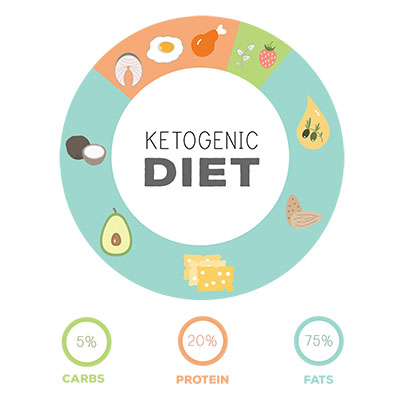Keto is the New Black – But Does it Suit Everyone?
The keto diet is everywhere.
Celebrities and influencers rave about it. Maybe you even have a friend or 2 who have tried it. From claims that it can cure disease to others boasting that they have never felt better, the keto diet has hit the pavement running.
But is it all it’s cracked up to be? Does it work for everyone?
Yes and no – Let us explain.
What is the Keto Diet?
The ketogenic diet is a low-carb, high-fat diet. It aims to put your body in ketosis, where fat is used as your body’s primary fuel source. Usually, your body uses sugar, or glucose, from your blood for energy. When blood sugar is low, the body turns to ketones.

Fat is broken down in the liver to produce ketones. Your body can, then, use these ketones for fuel. Ultimately, it can help lower one’s body fat percentage and avoid blood sugar spikes.
Yet, the keto diet didn’t start out this way. In the 1920s, the diet was developed to treat children with uncontrollable seizures. Today, doctors prescribe it when the patient has failed to respond to various seizure medication. It is closely monitored and frequently begins with a supervised hospital stay.
For the most part, the keto diet sounds great. So, what’s the problem?
Turning to Medical Experts for Answers
Everyone is different. There is no one-size-fits-all, especially when it comes to your health. What works for one person may or may not work for the next. Erin Mewshaw, a registered nurse from the New York Center for Innovative Medicine, adds that:
“While it has been around since the 1920’s, it’s long term effects on the body have not been heavily studied. Unfortunately, any diet that’s heavily focused on fat will eventually place an overabundance of stress on the gallbladder, liver, and pancreas, leading to problems such as pancreatitis, hepatic steatosis, and hyperlipidemia. We are constantly on the lookout for new diets that will give us better skin, a slimmer waist, and more energy, but we tend to overlook the basics. Our body needs a variety of nutrients, and any diet that’s heavily focused on only one macronutrient will eventually lead to deficiencies and stagnation within the body.”
Your body craves balance. It also functions its best when you incorporate a healthy and balanced diet into your lifestyle.
A short-term 2-4 week keto diet may prove beneficial, but in the long-term, various problems could arise. For children that are put on the diet for the treatment of seizures, doctors closely monitor possible side effects including kidney stones, slowed growth, and fractures.
Our body needs a variety of nutrients, and any diet that’s heavily focused on only one macronutrient will eventually lead to deficiencies and stagnation within the body.”
Dr. Mark Iwanicki, a Naturopathic Doctor, has put a handful of patients on the ketogenic diet. In general, he found:
- Men tend to lose more weight than women.
- It can cause lipid spikes, including LDL and total cholesterol.
- It is not very sustainable as a long-term lifestyle.
- Intermittent fasting can help kickoff ketosis.
- It seems that doing a balanced ketogenic diet including low carb veggies, as opposed to just meat and dairy, is better for the body.
Women tend to have a high body fat for reproductive purposes over men, which makes his first observation not entirely surprising. LDL, or low-density lipids, are labeled as the ‘bad cholesterol.’ While this ‘bad cholesterol’ does have its functions in the body, higher levels of it are associated with an increased risk of cardiovascular disease.
Long-term sustainability may relate to health complications that could arise, as well as accessibility. If you are traveling, you may not have many options that support a solely keto diet. And yet again, a balanced diet seems to reap the best benefits.
Final Thoughts on the Ketogenic Diet
With the keto diets and other popular fad diets, many individuals often forget that overall health is impacted by a variety of factors. If you want to lose weight, it comes down to essentially counting calories. Your calories out must be greater than your calories in to shed the pounds. However, if you intend on feeling good and providing your body with the best possible fuel, quality also comes into play. Your body requires multiple vitamins, minerals, and nutrients for optimal functioning. As Erin Mewshaw, RN, explained, ignoring this fact could lead to deficiencies and other health problems.
When it comes to diet and eating, other habits and choices come into the picture as well. For example, slowly eating and chewing your food allows time for your brain to recognize that your stomach is full. You avoid overeating and dodge those post-meal comatose feelings. It also promotes proper digestion.
It is important to assess any diet and determine if it’s best for you and your situation. Certain health conditions, especially relating to the gallbladder, liver, or pancreas, may become aggravated by a keto diet.
Remember, everyone is different. And the same goes for your health and what strategies work and don’t work. Find your unique and healthy balance! You and your body deserve it.
See how we can help you restore complete health of body, mind & spirit.
Join our mailing list and receive exclusive offers + information!







Leave a Reply
Want to join the discussion?Feel free to contribute!